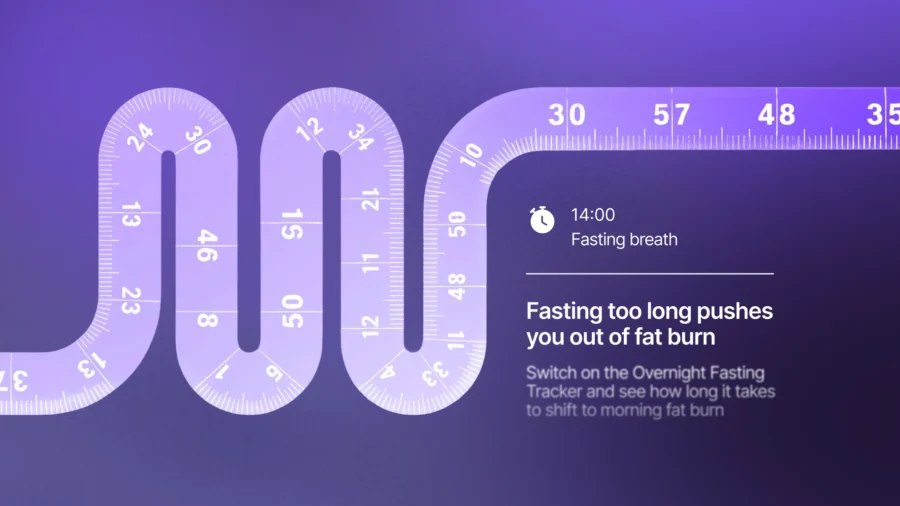How healthy sleep habits increase metabolic flexibility

R.D. Brea Lofton shares science-backed tips on how quality sleep transforms our overall health and well-being
Did you know a lack of sleep is closely correlated with weight gain, a slow metabolism, and the risk of health conditions? Numerous studies have also found that the lower our sleep quality, the slower our body is able to burn fat.

The odd one-nighter won't break the bank, but integrating healthy sleeping habits will definitely pay off! Sleep plays an integral role in regulating our metabolism as it affects numerous hormones and processes related to energy balance and nutrient utilization in the body. As part of our four-part series on building healthy lifestyle habits, Brea Lofton, a registered dietitian at Lumen, shares her tips for achieving quality sleep habits.
Let's dive in!
We spend ⅓ of our lives in bed and for a good reason! Sleep plays one of the most important roles in our metabolism, recovery, and overall health. More specifically, our sleep quality is closely correlated to weight gain, weight loss, and how your body metabolizes fat.
You need to know where you stand to understand how your sleep quality affects your metabolism. The one thing that increases when you sleep is fat burning.
Better quality sleep will help your body shift to fat burn overnight, granted that your metabolism is flexible. To optimize your metabolism, the first insight you need is to know what your current metabolic rate is.
Understanding where you stand will give you insights into what effect your sleep is having on your body and whether your body is able to shift to fat burn overnight. You can take this short quiz to assess your current metabolic health.


The connection between metabolic flexibility and sleep
Our metabolism is the process of how our body converts the food we eat into energy. Metabolic flexibility is when we're able to quickly and efficiently shift between different sources of energy, such as carbs, protein, and fat. This comes with a number of health benefits, and getting enough sleep is one of them.
Sleep plays an integral role in regulating our metabolism as it affects numerous hormones and processes related to energy balance and nutrient utilization in the body. We like to consider sleep as a session to reset itself.
During this time, our body can recuperate & repair itself after all the numerous demands and energy needs called upon it throughout the duration of our day. Moreover, good sleep and rest are vital to almost every system within the body, from our immune system to our digestion, even down to our metabolic health.
When we do not get enough sleep, internal responses can ignite within the body, correlating to increased hormones such as leptin, ghrelin, and cortisol.
Regulate Your BMI and Metabolism with Healthy Sleep Habits
If you're like most people, you probably don't think much about your metabolism. It's there, but it's not something that we tend to think about on a regular basis.
Studies have shown that people who get enough sleep have lower BMIs (body mass index) than those who don't. This is because when we're well-rested, our bodies produce more melatonin—a hormone that signals the brain to slow down and relax.
As a result of this new level of alertness during the day, many people find themselves naturally eating healthier foods as they go through their days (instead of grazing all night). When taking your morning measurement, you are able to assess whether you had a quality night of sleep and if your body was able to shift to fat burn.
The best part? To help boost metabolism, you don't need to spend hours each day in bed or even force yourself into a deep slumber; just being able to make it through at least 7-9 hours without waking up is enough!
Our data has shown that Lumen users that sleep approximately 7-9 hours per night will lose 1.5x more weight compared to users that sleep approximately 4-6 hours per night. To further back up our research, scientific studies have found that when you're sleep deprived, the hormones involved in regulating your metabolism and your appetite get disrupted.
"Prioritize your sleep and aim for 7-9 hours of sleep each night. Establishing a regular sleep schedule can also help regulate your body's circadian rhythm and support a healthy metabolism."
For instance, lack of sleep has been linked to alterations in hormones that control hunger and satiety, such as ghrelin and leptin. Ghrelin is a hormone that signals hunger, while leptin is a hormone that signals fullness. When we don't get enough sleep, our ghrelin levels tend to increase, and our leptin levels decrease. This can lead to increased feelings of hunger and a reduced sense of fullness, which can increase the risk of overeating and gaining weight over time. Cortisol is a stress hormone that can be impacted by a variety of factors, with sleep being one of them. This stress response can result in our metabolism 'switching gears' in an effort to prioritize & complement our energy needs where and when it is perceived that we need it most.
The Sweet Dreams Formula: Meal Timing
When you eat can also impact your metabolism and, ultimately, sleep. Eating right before bedtime can impact sleep quality and duration, as our digestive system will attempt to metabolize and absorb the foods from the recent meal while our bodies are simultaneously trying to 'reset' from the activities we have completed earlier in the day.
On the other hand, going to bed hungry can negatively impact sleep quality as well. When we are hungry, our body produces hormones like cortisol and adrenaline, which can increase alertness and make it harder to fall asleep. Additionally, low blood sugar levels can cause feelings of anxiety or restlessness which can also contribute to sleep interference.
"Try having a light meal a few hours before bedtime to allow sound digestion. Recent studies confirm that consuming your last meal 4 to 6 hours before bed is best for optimal sleep quality."
In an analysis of data derived from the American Time Use Survey (1), male and female participants who ate or drank 1 hour prior to bedtime were found to be at more than 2 times greater risk of waking up from sleep throughout the night compared to those who ate or drank earlier in the evening. As the time spent eating or drinking prior to bedtime expanded, the odds of short and long sleep durations and waking up after falling asleep decreased. The study's final analysis found that eating or drinking before bedtime led to longer sleep with more awakenings during the night. In fact, it is less efficient for the body and health to recuperate and consider their resting period as "a good night's sleep" overall.
Sleep lets us recharge, repair, and restore
When we sleep, our bodies can recharge, repair and restore. The brain enters into a state of rest and recovery after being active during the day. While you may be thinking about what you need to do in order to get ready for bed, your body is busy going through its own self-repair process as it goes into deeper levels of sleep.
Sleep helps your metabolism run more efficiently by:
- Slowing down digestion so food can be properly digested.
- Reducing stress hormones such as cortisol which can increase fat storage.
- By getting enough quality sleep, our bodies are able to enter into a state of rest and recovery, allowing our metabolic processes to run more efficiently.
"As someone who has struggled with poor sleep for years, I was amazed at how quickly I was able to see results and help me understand what food choices were impacting my sleep and what I could do to improve it."
Mark, 34, Texas Lumen User
What to eat and what not to eat before bed
Meal timing, types of food, and nutrition habits before you count sheep all play a huge role in how many hours of sleep you will be able to catch that night. Make sure to eat a light dinner at least three hours before lights out.
Bedtime snacks to help you sleep
While we don't recommend eating a bedtime snack, your daily eating routine might slip up. If you need to, ideally, your snack should be small and easy to digest, as heavy meals can interfere with sleep. Focus on consuming foods that increase melatonin and serotonin, calm the body, and prepare you for sleep.
Although no foods are considered the “magic trick” to getting a restful night's sleep, there are nutrients in a variety of foods that can support quality rest overall. Nutrients such as magnesium, calcium, tryptophan, and Vitamin D can be helpful in numerous ways, reducing internal stress levels and enhancing sleep quality.
Here are some foods that can help your sleep better:
- Complex carbohydrates - Foods such as whole-grain bread, pasta, and rice contain complex carbohydrates that can increase the production of the neurotransmitter serotonin, which helps regulate sleep.
- Lean proteins - Foods such as chicken, turkey, fish, and tofu contain the amino acid tryptophan, which can increase the production of serotonin and promote relaxation.
- Foods high in magnesium - nuts such as almonds, walnuts, and pistachios; and seeds such as pumpkin and sunflower seeds, contain magnesium, which can help promote relaxation and sleep.
- Herbal teas - Chamomile and valerian root tea are known for their relaxing properties and can help calm the mind and promote sleep.
Overall, eating a balanced diet that includes these types of foods may help improve sleep quality and promote overall health. It's also important to note that while certain foods may have sleep-promoting properties, they should be consumed as part of a balanced diet and not relied upon as the sole solution for sleep problems.
Foods that negatively impact sleep
If you overload your body with too much to process, quality sleep can become challenging to obtain. Your body needs calories to rest and recover; however, there are indeed foods that can have a negative impact on our quality of sleep (get your hands out of the cookie jar!), caffeine, or foods with dense calories, your body may be more focused on digestion than a restful night's sleep.
Try to avoid these foods before bed:
- Spicy and salty foods, and foods that are high in fat or overly processed, like many fast & convenience foods
- Caffeine and alcohol can impact the ability to reach a deeper state of sleep (REM sleep) and decrease nightly sleep duration. Both can affect the production of neurotransmitters in the brain that regulate sleep, leading to more sleep disruptions.
When you consume these foods close to bedtime, your body may experience physical discomfort, digestive issues, and other disruptions that can interfere with sleep.
"I was following the plan learning things about my body. Four months later, I lost 25 pounds!"
Linda, 53, Oklahoma


Sleep and Physiology
Eating before bed is linked to metabolic syndrome, a group of risk factors including high blood pressure and belly fat. This may also lead to increasing your chances of developing heart disease or type 2 diabetes.
Lack of Sleep Increases The Risk Health Conditions
A lack of adequate sleep has been linked to an increased risk for obesity, type 2 diabetes and cardiovascular disease. There are a number of reasons why this occurs.
First, when you're not getting enough quality sleep, your body processes food less efficiently, which means it takes longer for your body to digest it or burn off the calories gained from eating something new.
Second, if you're working at night or sleeping during the day, then there may not be time for proper decompression because your body is busy doing other things instead of taking time to shut down, relax, and get adequate sleep. This can cause your circadian rhythm to become out of sync with the daylight.
And third (perhaps most importantly), lack of sleep causes stress hormones such as cortisol levels to rise. This increases your appetite while reducing your body’s fat-burning ability within cells by reducing production levels.
Lack of Sleep and Insulin Resistance
Lack of sleep can also affect your energy levels and metabolism. Lack of sleep raises stress hormone levels, which causes insulin resistance. This can affect your energy levels and ability to burn fat.
Insulin is a hormone that helps cells use sugar as fuel for energy production in the body. When there is too much glucose (sugar) circulating in the bloodstream, this causes an increase in insulin production.
Our Lumen experts share that:
- Sleep deprivation can lead to overeating, which is why it's important that you get enough sleep.
- Lack of sleep can cause depression, weight gain, and low energy levels. This can make you feel like you need more food than usual—and if your body doesn't feel good from lack of rest, it will send out signals that tell you what it needs in order to function correctly (i.e., more calories).
"Eating well is critical for metabolic health. (It’s also really important for healthy sleep.) But a healthful diet is one component of maintaining a healthy metabolism, and lowering risks for cardiometabolic disease. Sleep matters to the health of your metabolism, independent of your diet."
Dr. Michael Breus, PhD, DABSM, FAASM
Clinical Psychologist, Sleep Medicine Expert
Tips for better quality sleep
Fortunately, there are plenty of things you can do to uplift your sleep quality! I often recommend turning to your favorite self-care techniques as your day draws to a close to allow the body, mind, and spirit to begin to relax and get ready for bed.
Some Lumen practices you can adopt to establish a bedtime routine include:
- Try meditation sessions or doing some light yoga
- Journaling your thoughts can help you gain control of your emotions and improve your mental health
- Practice deep breathing to relax and slow down the body
- Limit screen time at least an hour before bed
- Enjoy a bubble bath with a nice book
- Going to sleep at the right time for your body (and around the same time every night)
Additionally, using aromatics such as lavender and eucalyptus in an air diffuser can be quite soothing & peaceful to the mind to help you rest peacefully for a night of relaxing & quality slumber. Remember, establishing good sleep habits takes time and effort, but making small changes to your daily routine can make a big difference in your sleep quality and overall health.
"Sleep has a much bigger impact on our metabolism than we think. It's a crucial part of metabolic health. Without proper sleep, it's harder to train our metabolism to be flexible or more efficient at switching between fats and carbs as a fuel source."
Sleep and Metabolism
Getting enough sleep is crucial for boosting your metabolism. You may feel like you can be productive when you’re tired, but the truth is that your body needs to rest in order to perform at its best. By making sure that you get a good night’s sleep each night, you will help your body burn fat and build up muscle tissue. We hope this blog has helped you learn new habits for better sleep. As always, if you’re looking to level up your health with metrics and real-time data, we are here to help!







 Digital download
Digital download 


